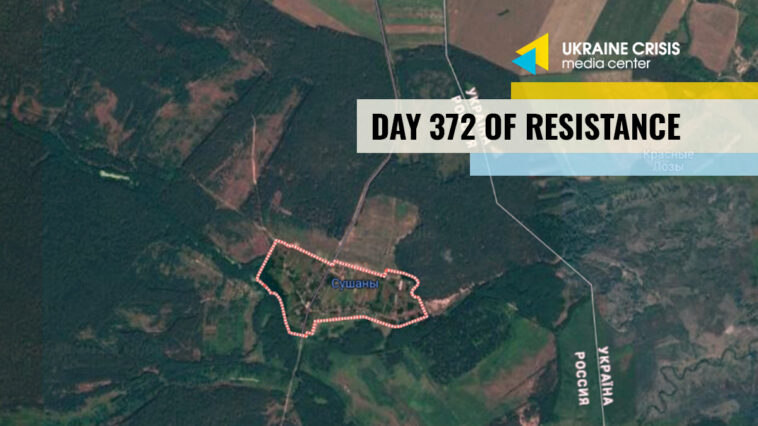What’s going on in Russia’s Bryansk region near Ukraine’s border?
On the morning of March 2, the governor of Russia’s Bryansk region bordering Ukraine claimed that a Ukrainian sabotage group allegedly crossed into the region, took local residents hostage, and opened fire on a moving car.
Citing the incident, Russian media released controversial reports. Rumors spread saying that Putin will hold a meeting of his national security council, a statement that the Kremlin’s press service later denied.
The Ukrainian Border Guard Service said that it maintains control of the situation at the border with Russia and described the reports of a “Ukrainian sabotage group” crossing into Russia as a provocation by the aggressor.
A group identifying itself as the Russian Volunteer Corps (RVC) claimed credit for crossing into Russia on March 2. The aim was to show that free Russian people, armed with weapons can stand against Putin’s regime. The group denied that a Ukrainian sabotage unit was involved.
A video surfaced later that day, showing two fighters claiming to be members of the Russian Volunteer Corps — Denis who goes by the call sign Rex and Aleksandr who goes by the call sign Fortuna, filmed outside a medical station in Bryansk region. They said they had crossed the border into Russia. RVC is supposedly fighting on Ukraine’s side in the war.
“We do not fight civilians, we do not kill unarmed people,” RVC fighters said on video. “It is time for regular Russian citizens to realize they are not slaves. Fight!” the group said.
Speaking earlier to Ukrainian media outlet The New Voice of Ukraine, fighters from the Russian Volunteer Corps said they foresee fighting inside Russia. When the Ukrainian Armed Forces will reach the Russian border, they will not be able to cross it, RVC said. It will be fighters from the Russian Volunteer Corps who will cross the border into Russia, they added. A hybrid war will begin in Russia, they proceeded, comparing it to the one that Russia began in Donbas in 2014. RVC will form a larger group to cross into more Russian border regions, including Kursk and Belgorod.
RVC fighters said they expect no international objection. An answer to the question: “Was Russia invaded?” will be: “No, these are the Russians fighting against the Russians. That’s their right to self-determination.”
RVC seeks to recruit within its ranks the Russians that are dissatisfied with Putin’s regime and ready to fight. A stand-off will begin inside Russia as a consequence of what the current Russian regime is doing, RVC members said.
Russian missiles strike Zaporizhzhia
Russia carried out a missile strike on Zaporizhzhia overnight into March 2. The missiles crashed into a five-story apartment building, destroying more than 10 apartments Three people were killed, and six more injured.
Eleven people were rescued from the rubble including a pregnant woman.
Ukrainian President Volodymyr Zelenskyi posted a video on Telegram, showing the site of the attack.
“The terrorist state wants to make each day a day of terror for our people. Evil will not take over in our land. We will force out all occupying troops. They will be definitely held to account for everything,” Zelenskyi said.
Ukrainian troops repel attacks on Bakhmut, strike Russian ammunition depot amid tense situation, Ukraine’s General Staff says
The Ukrainian Armed Forces repelled Russian attacks on Bakhmut and struck an ammunition depot, the General Staff of the Armed Forces of Ukraine said in an evening update on Thursday.
Over the past day, Ukraine’s Air Force conducted 13 airstrikes on areas where Russia has personnel and military equipment. Missile units and artillery hit a Russian ammunition depot.
Over the last 24 hours, the Russian forces launched 24 air strikes on Ukrainian positions, and three missile strikes on the cities of Chasiv Yar in Donetsk region and Zaporizhzhia. The attack damaged apartment buildings and caused civilian casualties.
The Russians made more than 55 attacks with multiple launch rocket systems. Civilian infrastructure in Ulanove in Sumy region was one of the targets.
The Commander of Ukraine’s land forces Colonel General Oleksandr Syrskyi visited Bakhmut in late February. He described the situation on the ground as extremely tense.
“Despite mounting losses, the enemy threw the most prepared Wagner units into the attack to try to break through the defenses of our troops and encircle the city,” Syrskyi said.
Ukrainian service member with the 93rd brigade Kholodnyi Yar, deployed to defend Bakhmut Andriy Babychev spoke of the Russian tactics.
“[The Russian forces] shell the city with everything they have, including Grad MLRS, artillery, and mortars. The hostile troops are backed by aircraft. They advance in small groups of five to ten people, and take cover in ruined houses, waiting for more groups to join them. When they form into larger groups, they can advance toward a street or building,” Babychev said.
The fiercest fighting takes place on the northern outskirts of the city, he added. Whether Bakhmut stands depends on the brigades standing on the flanks, where the Russian forces try to cut off the ammunition supply routes. “It has never been so difficult in Bakhmut,” the Ukrainian serviceman said.
Cultural solidarity across Europe in support of Ukraine. Ukraine in Flames #357
Russia’s current military aggression against Ukraine is a continuation of the russian empire’s previous long war with the Ukrainian language and culture, which was aimed at assimilating Ukrainians, turning them into “one nation” with russians. Preserving and rebuilding the destroyed cultural heritage is a part of the revival of Ukrainian culture, which is again a subject to russian aggression. Watch Ukraine in flames #357 to find out about cultural resistance of Ukrainians in the face of putin’s obsessive idea of destroying Ukraine and eradicating its cultural identity.
Guests:
- Mathieu Lericq, Host of the Event
- Alexis Nuselovici, Professor of General and Comparative Literature
- Constantin Sigov, Philosopher




